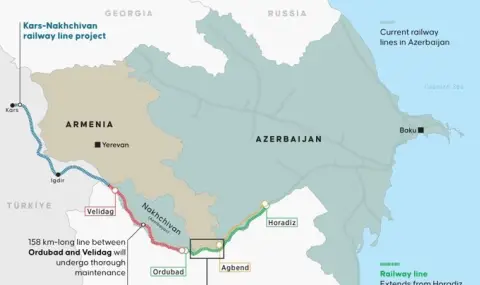Relations between Baku and Yerevan have remained tense since 1992-93, after Armenian armed forces occupied Karabakh and 7 adjacent regions of the Republic of Azerbaijan. Most of these internationally recognized territories of Azerbaijan were liberated by the Azerbaijani army during the 44-day Patriotic War in the fall of 2020, which officially ended with the signing of a declaration between Armenia and Azerbaijan on November 10, 2020. , which started the process of normalization of relations between the two countries.
After the signing of the joint declaration, Azerbaijan presented to Armenia the following 5 basic principles, which should form the basis of a final peace agreement:
1. Mutual recognition of the territorial integrity, inviolability of internationally recognized borders and political independence of each of the two countries.
2. Mutual confirmation of the absence of territorial claims to each other and acceptance of legally binding obligations not to make such claims in the future.
3. Obligation of the parties to refrain in their interstate relations from undermining the security of the other, from threats or use of force both against political independence and territorial integrity, and in any other way, inconsistent with the UN Charter.
4. Delimitation and demarcation of state borders and establishment of diplomatic relations.
Unblocking transport and other communications, building other communications as appropriate and establishing cooperation in other areas of mutual interest.
At the meetings in Prague and Sochi in October 2022, Azerbaijan and Armenia declared that they mutually recognize each other's territorial integrity and sovereignty. Thus, with the documents from Prague and Sochi, Armenia officially recognizes Azerbaijan's sovereignty over its Karabakh region.
Despite the official statements of Armenia to recognize the sovereign and territorial integrity of Azerbaijan, the Armenian side has not proceeded to amend the text of its Constitution, which speaks of the unification of Armenia with the Karabakh region of Azerbaijan. The numerous calls of official Baku to remove the given text from the Constitution of Armenia, which is a source of constant threat by Armenia to the sovereignty and territorial integrity of Azerbaijan, are diverted from official Yerevan.
In the process of normalization of relations, Azerbaijan, according to point 9 of the joint declaration of November 10, 2020, declares to ensure the unhindered movement and passage of citizens, means of transport and cargo between the western regions of Azerbaijan and its Nakhchivan Autonomous Republic , while the Armenian side torpedoed the already mutually agreed solution to the issue. The restoration of the transport artery (Zangezur Corridor) would bring multifaceted socio-economic and geostrategic dividends. The opening of the Zangezur Corridor, connecting Europe and Asia, will have a significant impact on all regional countries and the transport architecture of the region as a whole. The corridor will further strengthen the Caspian transport network, restore and expand rail connectivity between Russia, Azerbaijan, Turkey, Armenia and Iran and have a positive impact on regional trade activities. In practice, this would contribute to the establishment of sustainable peace, security and prosperity in the South Caucasus region.
However, not all countries are interested in establishing peace and stability in the region. An example of this is the military supplies of lethal and offensive weapons by France and India to Armenia. Armenia's militarization is fueling regional tensions and threatening to destroy the fragile truce with neighboring Azerbaijan. The growing revanchist sentiments also contribute to the validity of the fears of the authorities in Baku about the increasing militarization of Armenia, with some political and public leaders openly calling for the use of military force against Azerbaijan in order to reoccupy its Karabakh region.
To date, three blocks of issues remain, determining the earliest possible signing of a peace treaty and the normalization of relations between Armenia and Azerbaijan: renunciation of territorial claims, right of return of refugees and unblocking of communications. For Azerbaijan, Armenia's constitutional renunciation of claims to Azerbaijan's Karabakh region is of primary importance. In the words of the President of Azerbaijan, Ilham Aliyev, “the most important condition for reaching a peace agreement is the amendment of the Constitution of Armenia in the part in which territorial claims are made to Azerbaijan, and until that happens, a peace treaty it cannot be signed”.
The return of refugees is another issue in the process towards normalization. In this regard, it should be recalled that the exodus of Armenians from Karabakh was actually organized by their local leaders. The decision for the voluntary departure of the Armenians from Karabakh was made as a result of their refusal to live under the legitimately restored Azerbaijani government, which has repeatedly stated that persons of Armenian nationality who are not involved in war crimes can remain living in Azerbaijan as Azerbaijani citizens. In the opinion of official Baku, the guarantee of the right of return of the refugees should be ensured by both sides, and this applies to representatives of the West Azerbaijan Municipality, whose nearly 300,000 representatives were evicted from Armenia in 1987-89.
Regarding the issue of unblocking communications between West Azerbaijan and its Nakhchivan Autonomous Republic through the territory of Armenia, if it is impossible to provide such a connection through the Zangezur Corridor, Azerbaijan is able to provide connectivity through the territory of Iran, bypassing the territory of Armenia , which will leave the latter in current transport isolation.
In fact, today the main issue on which the signing of a peace treaty rests is precisely the unequivocal recognition of the sovereignty and territorial integrity of the parties and the renunciation of territorial claims, which in the case of Armenia will require a constitutional reform.

